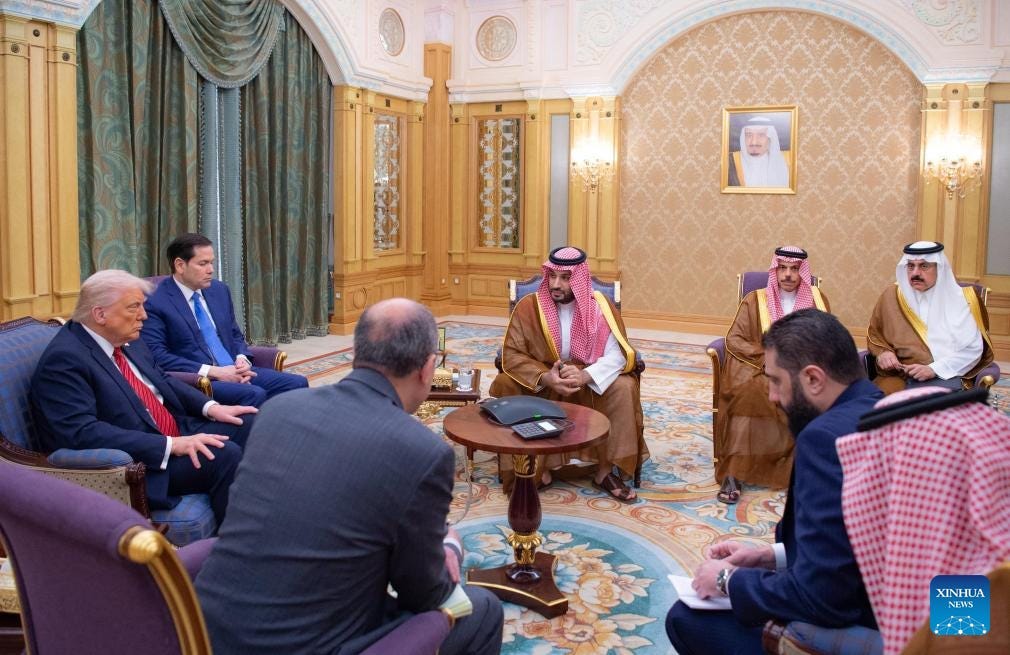An extract from
While Chinese experts agree that Trump’s Middle East policy is transactional and short-sighted, they are divided – and often silent – on whether his approach ultimately serves China’s interests.
June 2nd, 2025
The paper has 36 footnotes
U.S. President Donald Trump, Saudi Crown Prince and Prime Minister Mohammed bin Salman Al Saud, and Syrian interim leader Ahmed al-Sharaa attend a meeting in Riyadh, Saudi Arabia, on May 14, 2025. (Saudi Press Agency/Handout via Xinhua)
From May 13 to May 16, Donald Trump embarked on his first major international trip of his second term, a four-day tour of the Gulf, with the U.S. President visiting Saudi Arabia, Qatar and the United Arab Emirates (UAE). The visit focused heavily on securing business agreements, arms deals, and investment pledges aimed at boosting the U.S. economy. According to the White House, Trump secured enhanced cooperation with Saudi Arabia in sectors such as AI, defense and critical minerals, alongside a $142 billion arms deal and a commitment from Riyadh to invest $600 billion in the United States; meanwhile in Qatar and the UAE, agreements totaling over $1.4 trillion were signed, including plans to construct world’s largest AI campus outside of the U.S.
Beyond the business deals, this tour reflected a notable shift in U.S. policy on several critical regional issues, namely nuclear talks with Iran, engagement with Hamas, relations with Syria, and the ceasefire with the Houthis – negotiated without Israel’s endorsement. Significantly, unlike his previous 2017 trip, this visit to the Gulf did not include a stop in Tel Aviv or a meeting with Israeli Prime Minister Benjamin Netanyahu, an omission that has been widely interpreted as indicative of a broader strategic orientation in this “Trump 2.0” era.
Against this backdrop, this edition of the ChinaMed Observer examines the Chinese perspective on Trump’s Gulf diplomacy. The first section explores Chinese analyses of Trump’s foreign policy approach in the Middle East. Unsurprisingly, Chinese experts characterize the United States’ Middle East policy under Trump as transactional and commercially driven, mostly in negative terms. The second part breaks down Chinese assessments of the changes in U.S. policy toward specific regional actors and issues, with commentators viewing the deterioration of U.S.-Israel relations as the most consequential development, one that both influences and is shaped by Washington’s shifting approach to the region. Chinese experts also maintain that constraining China’s influence remains a principal objective of U.S. Middle East policy; however, they offer only indirect suggestions regarding the manner in which American actions affect Chinese interests, and the potential responses Beijing might take………….
Conclusion
There is a widespread perception among Chinese scholars that Trump’s approach is fundamentally “transactional.” He is willing to enact important shifts in U.S. Middle East policy if that allows him to position himself as a successful negotiator in diplomatic and economic fields. Chinese experts point to a range of examples supporting this view, from the easing of restrictions on AI-related products to the U.S.’ cooling relations with Israel. That said, despite the potential for major policy changes, Chinese experts believe that they might likely be short-lived. Describing Trump’s approach as erratic and short-sighted, they cast doubt on his willingness to commit to any specific course of action if met with too much resistance.
Chinese commentators provided only limited and indirect hints as to what all of this means for China. Some argued that containing China remains a key goal of U.S. strategy. Trump’s focus on economic deals with Middle Eastern partners could, in this view, put pressure on Beijing, particularly in areas where it has long benefited from American reluctance to share advanced technologies. While Chinese experts often frame the growing diplomatic independence of regional powers as a trend that reduces U.S. influence and enhances China’s influence, they also acknowledge the risk these same countries may halt or limit their cooperation with Beijing if offered more favorable terms by Washington.
At the same time, some of Trump’s actions, such as his pursuit of an agreement with Iran, are seen as consistent with Chinese interests. However, due to the vague nature of Chinese sources, it remains difficult to understand Beijing’s position on these developments.
The Author of this paper
Giorgia FACCHINI is Research Fellow at the ChinaMed Project.
She is also a graduate student in International Relations and Institutions of Asia and Africa at the University of Naples “L’Orientale.”
Her research interests include China's governance and administrative system, and China’s foreign policy and economic strategy.
The paper has 36 footnotes




